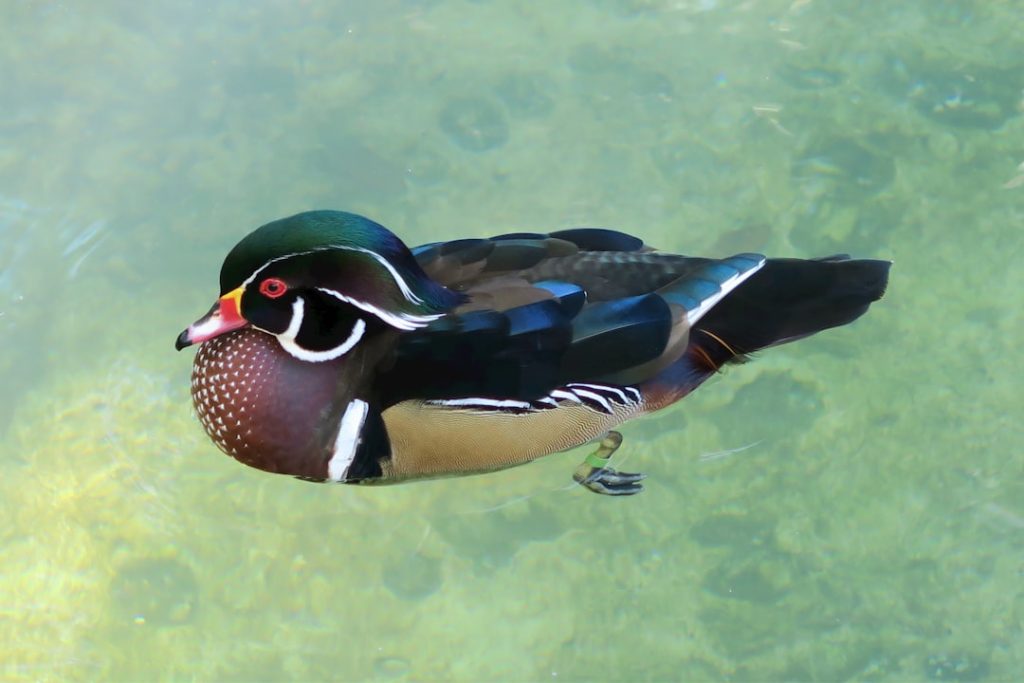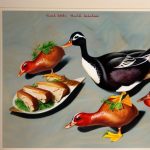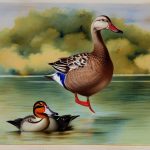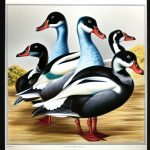Ducks have been domesticated for thousands of years, and there are now numerous breeds that have been developed for various purposes, including egg production, meat, and ornamental purposes. Domesticated duck breeds come in a wide variety of sizes, shapes, and colors, making them a popular choice for hobbyists and small-scale farmers. These birds are known for their hardiness, adaptability, and friendly dispositions, making them a great addition to any farm or backyard flock.
Domesticated duck breeds are also valued for their ability to forage for insects and other pests, making them a natural form of pest control in gardens and agricultural settings. Additionally, ducks are known for their high egg production, with some breeds laying as many as 300 eggs per year. With so many benefits to keeping domesticated ducks, it’s no wonder that they are becoming increasingly popular among homesteaders and sustainable living enthusiasts.
Table of Contents
- 1 Popular Domesticated Duck Breeds
- 2 Characteristics of Domesticated Duck Breeds
- 3 Choosing the Right Domesticated Duck Breed for Your Needs
- 4 Caring for Domesticated Duck Breeds
- 5 Breeding and Raising Domesticated Ducks
- 6 Conclusion and Resources for Domesticated Duck Breeders
- 7 FAQs
- 7.1 What are some popular domesticated duck breeds?
- 7.2 What are the characteristics of domesticated duck breeds?
- 7.3 What are the purposes of domesticated duck breeds?
- 7.4 What are the considerations for raising domesticated duck breeds?
- 7.5 What are some common health issues for domesticated duck breeds?
Key Takeaways
- Domesticated duck breeds have been selectively bred for various purposes such as meat, eggs, and ornamental purposes.
- Popular domesticated duck breeds include the Pekin, Khaki Campbell, Indian Runner, and Muscovy, each with their own unique characteristics and uses.
- Domesticated duck breeds can vary in size, color, temperament, and egg-laying capabilities, making it important to choose the right breed for your specific needs.
- When choosing the right domesticated duck breed, consider factors such as space, climate, intended use, and personal preferences.
- Caring for domesticated duck breeds involves providing proper housing, nutrition, and healthcare, as well as ensuring access to water for swimming and foraging.
Popular Domesticated Duck Breeds
There are numerous domesticated duck breeds to choose from, each with its own unique characteristics and qualities. Some of the most popular breeds include the Pekin, the Khaki Campbell, the Indian Runner, the Rouen, and the Muscovy. The Pekin duck is a large, white breed that is known for its excellent meat production and calm temperament. The Khaki Campbell is a prolific egg layer, often producing over 300 eggs per year, making it a popular choice for those interested in duck egg production. The Indian Runner is a tall, slender breed that is known for its upright posture and excellent foraging abilities. The Rouen is a large, colorful breed that is valued for both its meat and its ornamental qualities. Finally, the Muscovy is a unique breed that is known for its quiet nature and ability to fly, making it a popular choice for free-range operations.
Each of these breeds has its own unique characteristics and qualities, making it important to carefully consider your specific needs and goals when choosing a breed for your flock. Whether you are interested in egg production, meat production, or simply want to add some colorful characters to your farm or backyard, there is sure to be a domesticated duck breed that is perfect for you.
Characteristics of Domesticated Duck Breeds
Domesticated duck breeds come in a wide variety of sizes, shapes, and colors, each with its own unique set of characteristics. Some breeds are known for their excellent egg production, while others are valued for their meat production or ornamental qualities. Additionally, some breeds are better suited to free-range operations, while others are more content in a confined space. It’s important to carefully consider the specific characteristics of each breed before making a decision on which one is right for you.
In addition to their physical characteristics, domesticated duck breeds also vary in terms of their temperament and behavior. Some breeds are known for being calm and docile, making them easy to handle and care for, while others are more active and independent. Understanding the temperament of each breed is important when choosing a breed that will fit well with your existing flock or farm environment.
Finally, it’s important to consider the specific needs of each breed in terms of housing, feeding, and overall care. Some breeds may require more space or specialized housing, while others may have specific dietary needs. By carefully considering the characteristics of each breed, you can ensure that you choose a breed that will thrive in your specific environment and meet your individual needs and goals.
Choosing the Right Domesticated Duck Breed for Your Needs
When choosing a domesticated duck breed for your farm or backyard flock, it’s important to carefully consider your specific needs and goals. Whether you are interested in egg production, meat production, or simply want to add some colorful characters to your farm, there is sure to be a breed that is perfect for you. Consider factors such as egg production, meat quality, temperament, and space requirements when making your decision.
If you are primarily interested in egg production, breeds such as the Khaki Campbell or the Indian Runner may be good choices due to their prolific egg-laying abilities. On the other hand, if you are interested in meat production, breeds such as the Pekin or the Rouen may be better suited to your needs due to their large size and excellent meat quality. If you are looking for a breed that is easy to handle and care for, consider breeds with calm and docile temperaments such as the Pekin or the Muscovy.
It’s also important to consider the space requirements of each breed when making your decision. Some breeds may require more space to roam and forage, while others may be content in a smaller area. By carefully considering your specific needs and goals, you can choose a domesticated duck breed that will thrive in your environment and meet your individual requirements.
Caring for Domesticated Duck Breeds
Caring for domesticated duck breeds involves providing them with proper housing, nutrition, and healthcare to ensure their health and well-being. Ducks require access to clean water for drinking and bathing, as well as shelter from predators and the elements. Additionally, ducks should be provided with a balanced diet that includes a mix of commercial feed and access to forage for insects and plants.
Proper healthcare is also essential for maintaining the health of domesticated duck breeds. This includes regular check-ups with a veterinarian, vaccinations as needed, and parasite control. Ducks should also be provided with a clean living environment to prevent the spread of disease and ensure their overall well-being.
In addition to providing for their physical needs, it’s also important to consider the social needs of domesticated duck breeds. Ducks are social animals that thrive in the company of others, so it’s important to provide them with opportunities for social interaction and enrichment. This can include providing them with access to ponds or other water sources for swimming and bathing, as well as opportunities for foraging and exploring their environment.
Breeding and Raising Domesticated Ducks

Breeding and raising domesticated ducks can be a rewarding experience for those interested in expanding their flock or producing ducklings for sale. When breeding ducks, it’s important to carefully select breeding stock that exhibits the desired traits and characteristics that you are looking to perpetuate in future generations. This can include traits such as egg production, meat quality, or specific color patterns.
Once breeding stock has been selected, it’s important to provide them with proper housing and nutrition to ensure their health and well-being during the breeding process. Ducks should be provided with access to clean water for drinking and bathing, as well as a balanced diet that includes commercial feed and access to forage.
When raising ducklings, it’s important to provide them with proper care and nutrition to ensure their healthy growth and development. This includes providing them with access to clean water and a balanced diet that meets their specific nutritional needs. Additionally, ducklings should be provided with proper housing that protects them from predators and the elements.
By carefully considering the specific needs of breeding stock and ducklings, you can ensure that they thrive and grow into healthy adults. Whether you are interested in expanding your flock or producing ducklings for sale, breeding and raising domesticated ducks can be a rewarding experience that allows you to play an active role in perpetuating desirable traits within your flock.
Conclusion and Resources for Domesticated Duck Breeders
In conclusion, domesticated duck breeds come in a wide variety of sizes, shapes, and colors, each with its own unique set of characteristics and qualities. Whether you are interested in egg production, meat production, or simply want to add some colorful characters to your farm or backyard flock, there is sure to be a breed that is perfect for you. By carefully considering your specific needs and goals when choosing a breed, you can ensure that you select a breed that will thrive in your environment and meet your individual requirements.
For those interested in learning more about domesticated duck breeds or getting started with raising ducks, there are numerous resources available online and through local agricultural extension offices. These resources can provide valuable information on breed selection, care and housing requirements, nutrition, healthcare, breeding and raising ducklings, and more. Additionally, joining online forums or local poultry clubs can provide opportunities to connect with other duck enthusiasts and share knowledge and experiences.
Overall, domesticated duck breeds offer numerous benefits including egg production, meat production, pest control, and ornamental qualities. With proper care and consideration of their specific needs, ducks can be a valuable addition to any farm or backyard flock. Whether you are an experienced poultry keeper or just starting out with ducks, there is sure to be a breed that is perfect for you.
If you’re interested in learning more about domesticated duck breeds, you might also find our article on converting a shed to a chicken coop helpful. This article provides valuable insights into creating a suitable living space for poultry, which can be applicable to ducks as well. Understanding the importance of a well-designed coop can contribute to the overall health and well-being of your domesticated ducks.
FAQs
What are some popular domesticated duck breeds?
Some popular domesticated duck breeds include the Pekin, Khaki Campbell, Indian Runner, and Rouen.
What are the characteristics of domesticated duck breeds?
Domesticated duck breeds can vary in size, color, and temperament. They are known for their webbed feet, waterproof feathers, and ability to lay eggs.
What are the purposes of domesticated duck breeds?
Domesticated duck breeds are often kept for their eggs, meat, pest control, and as pets. Some breeds are also used for exhibition or ornamental purposes.
What are the considerations for raising domesticated duck breeds?
When raising domesticated duck breeds, it’s important to provide them with access to water for swimming and foraging, a balanced diet, shelter, and protection from predators.
What are some common health issues for domesticated duck breeds?
Common health issues for domesticated duck breeds include respiratory infections, bumblefoot, and egg binding. It’s important to provide proper veterinary care and maintain a clean living environment to prevent these issues.
Meet Walter, the feathered-friend fanatic of Florida! Nestled in the sunshine state, Walter struts through life with his feathered companions, clucking his way to happiness. With a coop that’s fancier than a five-star hotel, he’s the Don Juan of the chicken world. When he’s not teaching his hens to do the cha-cha, you’ll find him in a heated debate with his prized rooster, Sir Clucks-a-Lot. Walter’s poultry passion is no yolk; he’s the sunny-side-up guy you never knew you needed in your flock of friends!







